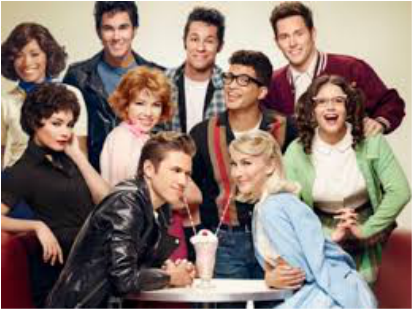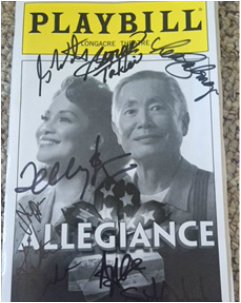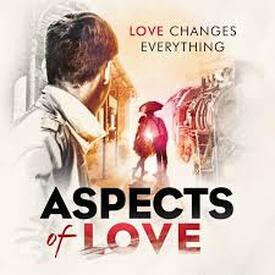 "Grease" Live! Renews Faith in the Fox Network If Not The Whole Worldby Randi / February 4, 2016
"Grease" Live! Renews Faith in the Fox Network If Not The Whole Worldby Randi / February 4, 2016It’s a shame that it’s closing, but that speaks more to how business goes in the winter for shows that aren’t behemoths more than the show’s quality. Plus, it’s upsetting as hell to spend time with the issues concerned. Many tourists don’t want to spend their one Broadway show slot crying their eyes out, and others would rather turn a blind eye to our past horrors. I saw “Allegiance” just for Takei and costar Lea Salonga, the superb and the beloved, but had low expectations after reading a few online reviews bemoaning the lackluster score.
While it’s true that the score might not add new standards to the cabaret circuit, it didn’t matter. It was basic but solid, with pleasant melodies and good lyrics. As a whole, everything worked and I didn’t roll my eyes violently even once, which is a rare thing with new musicals nowadays. (“Bend It Like Beckham” almost rendered me blind. I can’t even talk about it.) More importantly, this show was one of the most moving and heartbreaking I’ve ever seen. Although a completely different vibe from “Spring Awakening”, it reminded me of it, with its similar theme of how ignorance and refusing to treat others with humanity can destroy generations.
“Allegiance” is inspired by Takei’s own experience in the camps, which repeatedly acts like a gut punch, when you realize not only did this happen to hundreds of thousands of people, but to someone you feel like you know, someone who is standing right in front of you. I wonder how republicans would feel if they saw this. I mean it shouldn’t take knowing certain people personally or being able to point to them to make you see them as human, but as we learned from all the republicans who only came around to accepting gays as people when it was their own relative &c., a lot of people have trouble empathizing unless they’re forced to in that way. A lot of people are terrible!
The show begins with Takei as elderly Sam Kimura, WWII veteran, putting on his uniform to commemorate Pearl Harbor Day. He’s interrupted by a woman informing him that his older sister, Kei, has died. This woman, the executor of Kei’s will, has a package for Sam, who starts cursing the heavens and his long-estranged sister, angry that she couldn’t just leave him in peace. Uh, damn son! What happened to make you so mad at your sister and so wounded? Let’s find out!
After this present-day prologue, the core of the show starts, with young Sam (played by Telly Leung) and Kei (Lea Salonga) as young adults just before the war really hits America. They are Japanese Americans, born in the USA after their father Tatsuo (Christopheren Nomura) and now-deceased mother immigrated. The family, along with grandfather Ojii-san (played by Takei) who was born in Japan and speaks little English, lives in California where they own and run a successful farm. Tatsuo is hard on his son, and Sammy thinks his father’s disappointment and unreachable standards stem from his mother having died during childbirth. Sammy thinks his father blames him.
The family, well liked and respected in their town, soon has its world turned upside down when the USA is attacked at Pearl Harbor and the insane government decides to send everyone in the country with Japanese ancestry to the camps. Despite being born there and/or being legal citizens, the whole family is sent to Heart Mountain camp, with their farm, house, and all property seized, with no reimbursement. It’s awful, to say the least. Military personnel with power issues are running things at the camp. There’s no clean water, no medicine, no privacy, and no freedom. Sure the writers took some dramatic liberties elaborating on reality, but still, even without the embellishments it’s still a mfing hellish internment camp.
Sammy is a young idealist who refuses to complain about or fight against his circumstances, who wants desperately to be a standup, respectable American, and a model Japanese-American man. But this drive to please his country’s government means he betrays his family’s and his people’s dignity. Instead of exercising civil disobedience or active insubordination with other inmates like his sister’s new boyfriend Frank, Sammy not only obeys but tries to get everyone else to conform as well, thinking that it’s for their own good in the long run. He makes friends with the head of the Japanese American Citizens League, Masaoka (Greg Watanabe), the ineffectual official who doesn’t fight hard enough, or at all, to stop the internment. Sammy helps him by identifying disloyal citizens, like Frank, who refuses to cooperate and refuses to join the army, burning his draft card. To be fair, it seems like a pretty dick move to draft people who you threw in internment camps, so we can’t fault Frank at all. But Sammy does, big time.
Despite being so troublesome in this regard, Sammy is pretty likeable due to Telly Leung’s portrayal. Telly, who can rival Jonathan Groff with how much he spits while singing, shows you that Sammy is not a traitor to any group but is trying to figure out the right path to take in a time when nothing was done right. He’s young, he’s naïve, and he’s trying to do the best he can by people who will never agree. While in the camp, he falls in love with the white nurse on campus, Hannah, played by Katie Rose Clarke. I heavily disliked her in ‘The Light in the Piazza’ when she took over for Kelli O’Hara, but that role is nigh impossible to nail down properly. Here, Katie is extremely likeable and well used.
Spoilies for my memory: Before all that goes down, Sammy joins the army and becomes a poster child for the government’s propaganda campaign on how successful the camps are and how some Japanese can be exemplary Americans. He promised nurse Hannah that he would come back to marry her – who would have thought he’d survive and she wouldn’t. His father, meanwhile, refuses to answer a bogus loyalty questionnaire in the manner the government wants, and is sent to prison. Kei gets preggers by Frank and they get married. Ojii-san, Takei’s wonderfully stereotypically grandfather character, full of wisdom and optimism, dies in the garden that he somehow managed to grow in their desolate mountain camp. It’s all pretty depressing stuff, one right after the other, all while Sammy is deep in the trenches with no idea.
Meanwhile, Sammy is becoming a huge media star, this poster child for the war and all the decisions the government made, and he ends up on the cover of Life magazine. Tatsuo, in that horrible prison where he’s treated abominably, is released by the government just because of his son’s work. Although we were led to think Tatsuo was always disappointed in his son, he was just a tough old man but loved his son. He’s so proud of his soldier son even though they disagree, and he was overjoyed to see him on the magazine cover.
But when Sammy returns, everything has changed. The camps have been emptied, and he finds that his sister has her own family. When Sammy sees, after being through war, that his sister married the man he hates for refusing to defend America and that his father has accepted Frank into the family, he storms off – for good. That was the last time he saw any of them. The rift we heard about in the prologue has been that long, like 60 years. Insanity.
We cut back to present day, and old-man Sam (Takei) opens the package the executor left him. It’s that copy of Life magazine with him on the cover that his father and then his sister saved and cherished for all those years because they always loved him and were proud of him. So this is when everyone in the audience – EVERYONE – started sobbing if they hadn’t already been. Most people were like me and were just crying the whole time. But at this point the stragglers joined in.
Sam goes to Kei’s funeral to pay his respects and get some sort of closure. Afterwards, the executor walks over to him to see how he is. They share a few words before she mentions her mother – Kei. This is Hannah, Kei’s daughter whom Sammy met just once when she was a baby. They named her after Sammy’s nurse girlfriend, after she died saving Frank’s life. I mean. It may seem overwrought but it all worked so magnificently. Oh this is when the whole audience continued crying but much more violently and breathlessly, more like wailing. It was rough. And amazing. I’ve never been a part of an audience that was so emotionally invested and it was really special.
Also really special? Being that close to George Takei and Lea Salonga, George we know and love because of his real life persona post-Star Trek. Lea is a theatre goddess, after originating the role of Kim in “Miss Saigon” when she was just 18, in 1989. She also played Eponine in Les Miserables on Broadway so she just dies in every single f-ing show she’s in. Can we maybe get a show for Lea where she lives at the end? Anyway, her voice was spellbinding then and she is similarly captivating and wonderful here. She rightly gets the best songs, including the heartbreaking “Higher” and the show’s anthem “Gaman”, which is a Buddhist word meaning patience, perseverance, and ‘enduring the seemingly unbearable with dignity’. Like I said, the score isn’t life-changing but it is satisfying and moving, and these two songs alone make a case for it.
“Allegiance” won’t win any awards and will close far from recouping, but it’s a lovely show that is so heartfelt and powerful. I hope it has a long life with regional productions and maybe most importantly school shows. It’s the kind of show that needs to be performed and seen everywhere. I spoke with Takei after the show about how awful it is that the show’s lessons are so relevant today, when we should know better. He was the best person ever at stage door, by the way, and talked for a while about how he hopes the country will make good decisions and stop putting blatant racists in power. My words; George was much more eloquent and kind than I could ever hope to be. I hope for all of our sakes that the message this show shares so beautifully is shared, and embraced.






